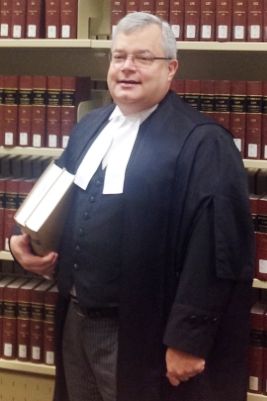
As the class of Law’18 prepares for the bar, a number of Queen’s Law students and graduates are also preparing for one of the profession’s most sought challenges. Queen’s Law students are being given clerkships in courts from coast to coast, including some of Canada’s most prestigious institutions.
Three Queen’s Law students will be with the Supreme Court of Canada – a record for the school in common-law JD student placements – four with the Federal Court of Appeal, and three with the Ontario Superior Court.
Good clerking news doesn’t end there, either: two Queen’s Law students will be joining the Federal Court as clerks, as well as one each at the Ontario Court of Appeal and the Court of Queen’s Bench of Alberta.
Justice David Stratas, Law’84, LLD’12, and seated on the Federal Court of Appeal, thinks the court offers clerks an opportunity to work on the “cutting edge” of law. “The FCA handles constitutional law, administrative law and intellectual property law, to name just three areas of great public concern these days,” he says. “Environmental and Indigenous concerns about an interprovincial pipeline? That’s just one example of the sort of case that we have to consider. The Federal Court of Appeal does more of this sort of law than any other court in the country.”
For Justice Stratas, the Federal Court of Appeal offers a distinctively beneficial approach to clerking. “Each judge hires a single law clerk: the relationship is one on one,” he explains. “Thus, a clerk gets a close working and mentoring relationship with one of the country’s top judges working on some of the most important and perplexing cases around.”
He is particularly proud of Queen’s Law clerking numbers this year: “Queen’s will have four clerking spots out of 15 overall, with the rest drawn from other law schools in the country. Four out of 15 from Queen’s law school in a national competition? I am one proud alumnus of Queen’s Law!” he says.
His clerk, Sarah Faber, Law’18, is just as proud to be working with Stratas. “I am looking forward to diving into some of my favourite areas of law, and being able to witness great written and oral advocacy,” she says. “This will be an amazing year of growth and challenges, but mostly I'm excited about how much fun it will be to work with Justice Stratas and the team of other clerks.”
“I look forward to applying the theoretical skills I learned at Queen’s to real life situations,” says Elliot Herzig, Law’17, also at the Federal Court of Appeal and clerking for the Honourable Johanne Gauthier. “I’ve spent years studying what should be done. Now I get to see what’s actually done. I’m also excited to meet other clerks. I value the relationships that I made at Queen’s at least as much as the education I received. Hopefully, I’ll make the kind of friends clerking as I did studying.”
Following recent changes to the structure of clerkships at the Supreme Court of Canada, Queen’s Law is also enjoying record numbers of students clerking at the SCC – more JD students than the school has ever placed at the Court.
Rory Tighe, Law’17, who will be working with Justice Rosalie Abella at the Supreme Court of Canada, says the opportunity is the fulfilment of a long-standing goal. “I have wanted to work for Justice Abella since I first saw her give a speech in my first year at Queen’s about standing up for your beliefs and defending your values. Working with her is definitely what I am most excited for. I am also looking forward to learning a lot about a broad variety of areas within the law and working with a diverse group of students from all over the country.
“I think this clerkship will go a long way in improving my legal reasoning, writing, and research skills,” Tighe continues. “I also think that the insight I will gain into the process used to decide questions of significance to the whole country will be invaluable for my personal and professional development.”
For Emily Lieffers, Law’17, a Supreme Court clerkship with Justice Karakatsanis is an opportunity to expand her knowledge and connect with more young minds in law. “I think I'm most looking forward to working with and learning from judges and clerks from around the country,” she says.
“I've learned so much from my classmates at Queen's and from my current co-workers in Ontario, and I'm excited to get even greater regional exposure and work with bright, talented people from across the country. I think young lawyers beginning their careers are like sponges, and so the chance to spend these formative years – learning to what it means to be a compelling advocate, a good colleague, and an ethical lawyer – in the company of some of the best advocates and most distinguished jurists in the country is an incredible learning opportunity and honour.”
Queen’s Law students receiving clerkships in 2018
| Court | Name | Judge |
| Supreme Court of Canada |
Emily Lieffers, Law'17 |
Karakatsanis |
| Federal Court of Appeal | Siobhan Morris, Law'19 Sarah Faber, Law'18 Elliot Herzig, Law'17 Blake Van Santen, Law’18 |
Woods |
| Federal Court | Leah Thompson, Law'17 Kristen Barber, Law'18 |
Elliott Locke |
| Ontario Superior Court | Ryan Mullins, Law'19 Narin Sdieq, Law'19 Cole Pizzo, Law'19 |
|
| Ontario Court of Appeal | Paul Socka, Law‘18 | |
| Court of Queen’s Bench of Alberta | Taylor Hudson, Law'19 |